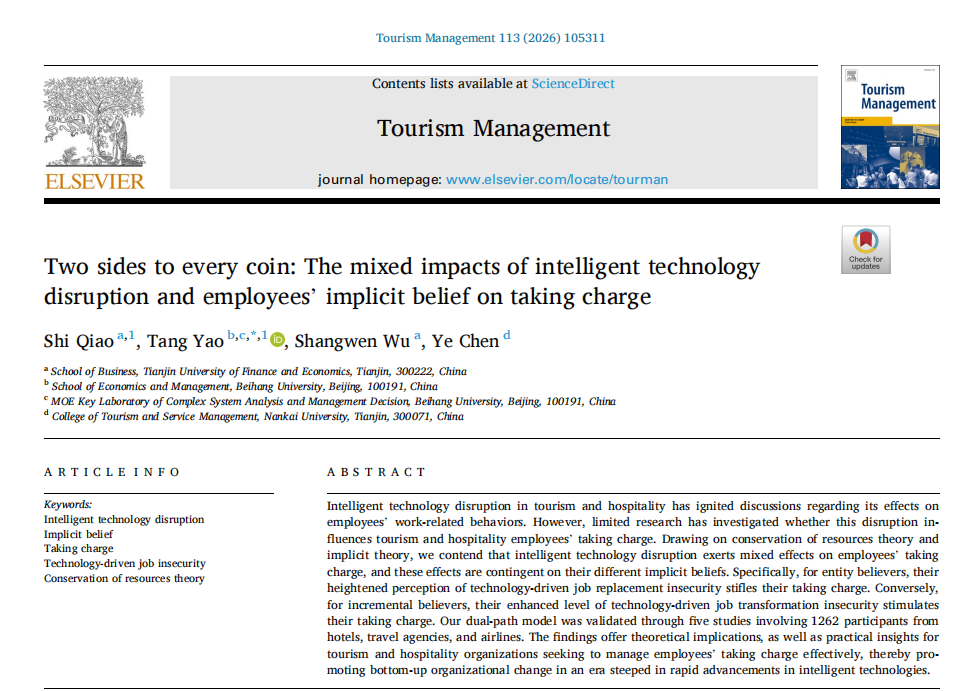On September 23, 2025, an inter-university research team led by Associate Professor Tang Yao (the sole corresponding author) from School of Economics and Management, Beihang University, published an academic paper titled “Two sides to every coin: The mixed impacts of intelligent technology disruption and employees’ implicit belief on taking charge” online in Tourism Management, a top international academic journal in the field of tourism management. This paper provides a novel theoretical perspective and practical path for employee management within the tourism and hospitality industry in the era of the digital and intelligent transformation of.

Core of the research: Resolving the dilemma of employee proactive behavior under the era of intelligent technology disruption
Currently, the in-depth penetration of intelligent technology in the tourism and hospitality industries has aroused widespread concern in both academic and industrial communities about changes in employees’ proactive behaviors. However, there is still a lack of systematic research on how intelligent technology disruption affects employees’ taking charge.
This study innovatively integrates two classic frameworks, namely the “Conservation of Resources Theory” and the “Implicit Theory”, and puts forward a core viewpoint: The impact of intelligent technology disruption on employees’ taking charge is not one-dimensional, but presents a complex effect of coexistence of “inhibition and promotion”. The final direction of this impact is determined by the type of employees’ implicit beliefs, which is specifically manifested in two differentiated paths:
●Employees with the entity theory will regard intelligent technology as a direct substitution threat. Their perception of technology-driven job replacement insecurity is significantly enhanced, and thus they will take the initiative to reduce their taking charge due to concerns about resource loss.
●Employees with the incremental theory are more inclined to view intelligent technology as an opportunity for transformation. Their perception of technology-driven job transformation insecurity will stimulate their awareness of self-improvement, prompting them to acquire new resources and adapt to new needs through taking charge.
To verify the scientificity of the above-mentioned “dual-path model”, the research team conducted five empirical studies, covering three tourism and hospitality sectors, namely hotels, travel agencies, and airlines. A total of 1,262 front-line employees and managers were included as research subjects. Through data demonstration in multiple scenarios and with a large sample size, the validity and generalization of the theoretical model were finally confirmed.
The publication of this study not only fills the research gap in the interdisciplinary field of intelligent technology and employees’ taking charge at the theoretical level and reveals the key regulatory role of employees’ implicit beliefs in this field, but also provides precise management insights for tourism and hospitality enterprises at the practical level. It helps enterprises effectively guide employees’ taking charge, transform the challenges brought by intelligent technology disruption into the driving force for organizational innovation, and promote “bottom-up” endogenous changes, thereby providing strong support for the high-quality development of the tourism and hospitality industries in the era of digitalization and intellectualization.
Tourism Management is a globally recognized authoritative academic journal in the field of tourism management. It ranks first among the three top journals (the other two being Annals of Tourism Research and Journal of Travel Research) in this field and holds a number of top journal certifications:
●A 4-star journal (the highest level) certified by the Association of Business Schools (ABS) in the UK.
●A Tier 1 TOP journal in the Journal Ranking of the Chinese Academy of Sciences (CAS Ranking).
●With an impact factor of 12.4 in 2024, it enjoys extremely high academic influence and industry recognition in the field of tourism management and related disciplines.
The full text of the paper can be accessed via the link: https://www.sciencedirect.com/science/article/pii/S0261517725001815